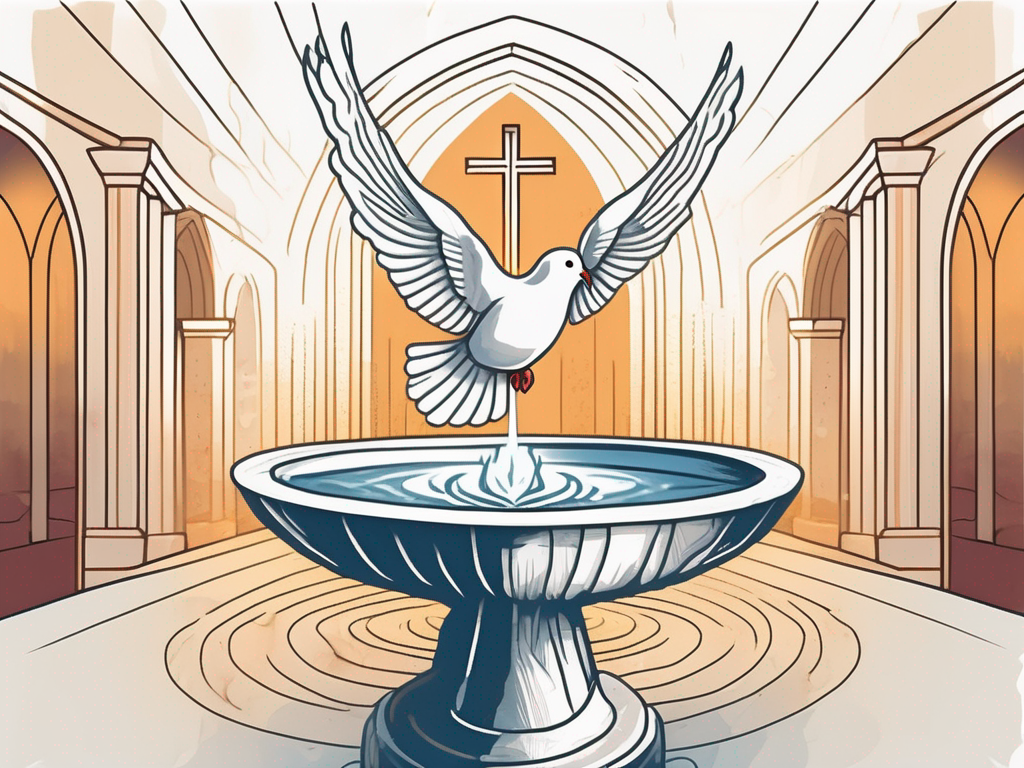Confirmation is a significant sacrament in Christianity that holds great importance for believers. It is a rite of passage that marks the moment when an individual publicly affirms their commitment to their faith. In this comprehensive guide, we will explore the concept of confirmation, its biblical basis, its theological significance, the practices in different Christian denominations, the process involved, and the symbols and rituals associated with this sacrament.
Understanding the Concept of Confirmation
Confirmation, often referred to as the “sealing of the Holy Spirit,” is a sacrament that solidifies and strengthens the bond between an individual and their faith. It is seen as a spiritual awakening or coming of age, where one takes ownership of their beliefs and embraces their role as a member of the Christian community.
The Biblical Basis for Confirmation
The foundation for the sacrament of confirmation can be traced back to biblical times. In the New Testament, we find references to the Holy Spirit being bestowed upon believers through the laying on of hands. Acts 8:14-17 recounts the story of the Samarian believers receiving the Holy Spirit after the apostles laid their hands on them. This practice of imparting the Holy Spirit through the laying on of hands forms the basis for the sacrament of confirmation.
Moreover, the concept of confirmation can also be seen in the Old Testament. In the book of Numbers, Moses is instructed by God to lay his hands on Joshua, his successor, and impart some of his authority to him. This act symbolized the passing of the mantle of leadership and the empowering of Joshua to fulfill his role. Similarly, in confirmation, the laying on of hands represents the transmission of spiritual authority and the empowerment of the confirmed individual to live out their faith.
Furthermore, confirmation finds its roots in the Jewish tradition of bar mitzvah and bat mitzvah. These ceremonies mark the coming of age of Jewish boys and girls, where they take on the responsibilities and privileges of adulthood within the faith community. In a similar vein, confirmation in Christianity signifies a rite of passage where individuals affirm their commitment to their faith and take on greater responsibility within the Church.
The Theological Significance of Confirmation
Confirmation holds immense theological significance within Christianity. It is viewed as a means of grace whereby the Holy Spirit strengthens and empowers the confirmed individual to live out their faith. Through confirmation, believers are believed to receive the gifts of the Holy Spirit, such as wisdom, understanding, counsel, fortitude, knowledge, piety, and fear of the Lord. These gifts aid individuals in their spiritual journey, guiding them in making decisions aligned with their faith.
Moreover, confirmation is seen as a sacrament of initiation, along with baptism and the Eucharist. These three sacraments are considered the foundation of the Christian life, marking the beginning of one’s journey as a follower of Christ. While baptism is the sacrament of rebirth and entry into the Church, confirmation is the sacrament that strengthens and deepens the grace received in baptism. It is through confirmation that individuals are fully initiated into the Church and become active participants in the mission of spreading the Gospel.
Additionally, confirmation is often associated with the concept of spiritual maturity. It is seen as a step towards spiritual growth and a deeper understanding of one’s faith. Through the sacrament, individuals are encouraged to reflect on their beliefs, engage in prayer and study, and actively participate in the life of the Church. Confirmation serves as a catalyst for personal and spiritual development, fostering a stronger connection with God and a greater sense of belonging within the Christian community.
Furthermore, confirmation is not a one-time event but rather a lifelong process. It is an ongoing journey of faith, where individuals are called to continually deepen their relationship with God and live out the values and teachings of Jesus Christ. Confirmation serves as a reminder of the commitment made and the responsibility undertaken to live as a faithful disciple of Christ.
The Rite of Confirmation in Different Christian Denominations
While confirmation is a common sacrament across various Christian denominations, there are variations in practices and beliefs surrounding this rite. Let us delve into some of the specific approaches to confirmation in Catholicism, Protestant churches, and Orthodox Christianity.
Confirmation in Catholicism
In Catholicism, confirmation is seen as one of the three sacraments of initiation, alongside baptism and the Eucharist. Typically, confirmation takes place during the teenage years when individuals are deemed ready to publicly profess their faith. The bishop, as the successor of the apostles, administers the sacrament by anointing the individual with chrism oil and laying hands on them. The confirmation ceremony is a solemn occasion filled with prayers and blessings.
During the confirmation preparation process, candidates undergo catechesis to deepen their understanding of the faith and the significance of the sacrament. They learn about the seven gifts of the Holy Spirit, which are wisdom, understanding, counsel, fortitude, knowledge, piety, and fear of the Lord. These gifts are believed to strengthen and guide the confirmed individuals in their spiritual journey.
After receiving the sacrament of confirmation, Catholics are encouraged to actively participate in the life of the Church. They are called to live out their faith, serve others, and be witnesses of Christ’s love in the world. Many Catholic parishes offer opportunities for confirmed individuals to engage in ministries, such as altar serving, lectoring, or volunteering in charitable organizations.
Confirmation in Protestant Churches
Protestant churches, on the other hand, have varying practices regarding confirmation. Some denominations view it as a significant sacrament, while others consider it more of a public declaration or a personal commitment to faith. The age at which confirmation takes place also differs among Protestant churches, with some conducting it during adolescence and others during adulthood.
In some Protestant traditions, confirmation is closely tied to the process of catechesis, where individuals are instructed in the teachings of the faith. This period of instruction allows candidates to explore their beliefs and make a conscious decision to affirm their faith. The confirmation ceremony often involves the laying on of hands or a prayer of blessing by the clergy, symbolizing the reception of the Holy Spirit.
After confirmation, individuals are encouraged to actively participate in the life of the church community. They may join small groups, Bible studies, or engage in outreach programs to deepen their faith and serve others. Protestant churches often emphasize the importance of personal relationship with God and the need for ongoing spiritual growth.
Confirmation in Orthodox Christianity
In Orthodox Christianity, confirmation, known as chrismation, is an integral part of the holy sacraments. It is administered by the priest, who anoints the individual with holy chrism on various parts of the body. This anointing symbolizes the sealing and empowering of the Holy Spirit within the confirmed person. Orthodox Christians regard chrismation as essential for the reception of Holy Communion.
Chrismation in the Orthodox Church is typically performed immediately after baptism, as both sacraments are seen as interconnected. The anointing with chrism is accompanied by prayers invoking the Holy Spirit and asking for the newly baptized and confirmed individual to be filled with the grace of God. The chrism used in the sacrament is a mixture of olive oil and various aromatic substances, which is blessed by the bishop during a special ceremony called the Chrismation of the Holy Chrism.
After chrismation, Orthodox Christians are encouraged to live out their faith in accordance with the teachings of the Church. They participate in the sacraments, engage in prayer and fasting, and strive to cultivate virtues in their daily lives. The confirmed individuals are seen as members of the Body of Christ, called to be a living witness of the Orthodox faith.
The Process of Confirmation
The process of confirmation encompasses several stages, from pre-confirmation preparation to the confirmation ceremony and the responsibilities that follow.
Confirmation is a significant milestone in the journey of faith, marking a deeper commitment to the Christian beliefs and values. It is a sacrament that holds great importance in many Christian traditions, including the Catholic, Orthodox, and Anglican Churches.
Pre-Confirmation Preparation
Prior to receiving confirmation, individuals undergo a period of preparation to deepen their knowledge and understanding of the faith. This preparation often includes catechetical classes, retreats, and spiritual exercises. It is during this time that candidates are encouraged to reflect on their beliefs, ask questions, and discern their commitment to their faith.
These pre-confirmation activities provide a space for candidates to explore their spirituality, learn about the teachings of the Church, and develop a personal relationship with God. Catechetical classes, led by experienced instructors, delve into various aspects of Christian doctrine, scripture, and the history of the Church. Retreats offer a chance for reflection, prayer, and communal bonding, as candidates come together to share their experiences and deepen their faith.
The Confirmation Ceremony
The confirmation ceremony itself is a momentous occasion filled with reverence and joy. It typically takes place during a regular church service or as a separate event. The confirmed individuals gather before the minister, bishop, or priest, who invokes the Holy Spirit to descend upon them.
The ceremony is often characterized by a sense of solemnity and celebration. The candidates, dressed in their finest attire, stand before the altar, surrounded by their families, friends, and fellow believers. The atmosphere is charged with anticipation as the minister delivers a sermon, emphasizing the significance of the sacrament and the responsibilities that come with it.
Following the sermon, each candidate approaches the minister, who anoints them with chrism oil. The minister makes the sign of the cross on their forehead, symbolizing the seal of the Holy Spirit and the indelible mark of confirmation. This anointing is a powerful moment, signifying the strengthening and empowering of the candidates with the gifts of the Holy Spirit.
Post-Confirmation Responsibilities
Following confirmation, individuals are expected to actively live out their faith and embrace their responsibilities within the Christian community. These responsibilities may include participating in church activities, serving as mentors to younger believers, engaging in acts of service and charity, and continuing to grow in their relationship with God.
Confirmation is not seen as the end of a journey but rather the beginning of a lifelong commitment to living a Christ-centered life. Confirmed individuals are encouraged to actively participate in the life of the Church, attending regular worship services, joining small groups or ministries, and contributing to the spiritual growth of the community.
Furthermore, confirmed individuals are called to be witnesses of their faith, both in their words and actions. They are encouraged to share their experiences, offer guidance and support to others, and be a source of inspiration and encouragement to those around them.
Acts of service and charity are also integral to the post-confirmation responsibilities. Confirmed individuals are encouraged to engage in acts of kindness, compassion, and justice, extending the love of Christ to those in need. This may involve volunteering at local charities, participating in mission trips, or advocating for social justice issues.
Finally, confirmation is seen as an ongoing process of growth and deepening of one’s relationship with God. Confirmed individuals are encouraged to continue seeking spiritual nourishment through prayer, reading scripture, participating in spiritual retreats, and seeking guidance from spiritual mentors.
Confirmation is a transformative experience that empowers individuals to live out their faith with conviction, compassion, and purpose. It is a journey that begins with pre-confirmation preparation, culminates in the sacramental ceremony, and continues through a lifetime of embracing the responsibilities of being a confirmed Christian.
Symbols and Rituals in Confirmation
Throughout the confirmation ceremony, various symbols and rituals play a significant role in conveying the spiritual meaning and significance of the sacrament.
The Laying on of Hands
The laying on of hands is a prominent ritual in confirmation, representing the impartation of the Holy Spirit. It harkens back to biblical times when the apostles laid their hands on believers to invoke the presence of the Holy Spirit. The practice symbolizes the transfer of spiritual power and the commissioning of the confirmed individuals to go forth as ambassadors of Christ.
The Anointing with Chrism
Another important symbol in confirmation is the anointing with chrism oil. This oil, blessed by the bishop or priest, represents the presence and power of the Holy Spirit. The anointing is performed with the sign of the cross on the forehead, indicating that the confirmed individuals are sealed with the gift of the Holy Spirit and marked as followers of Christ.
The Confirmation Name
Choosing a confirmation name is a tradition observed in many Christian denominations. It allows the confirmed individual to adopt a new name, typically that of a saint or biblical figure, as they embark on their journey of faith. The chosen name serves as a reminder of the virtues and qualities they strive to emulate in their Christian life.
In conclusion, confirmation in Christianity is a multifaceted sacrament that signifies the strengthening of one’s commitment to the faith. It draws upon biblical foundations, holds theological significance, and is practiced in various ways across Christian denominations. The process of confirmation involves both preparation and active participation, and it is marked by symbols and rituals that encapsulate the transformative power of the Holy Spirit. As believers embrace this sacred sacrament, they are empowered to live out their faith and fulfill their role as ambassadors of Christ within the Christian community.












